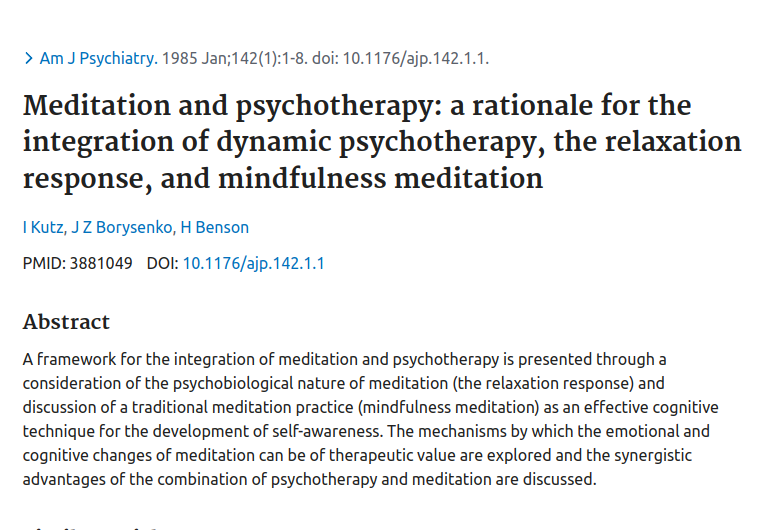Publication
The American Journal of Psychiatry
Abstract
A framework for the integration of meditation and psychotherapy is presented through a consideration of the psychobiological nature of meditation (the relaxation response) and discussion of a traditional meditation practice (mindfulness meditation) as an effective cognitive technique for the development of self-awareness. The mechanisms by which the emotional and cognitive changes of meditation can be of therapeutic value are explored and the synergistic advantages of the combination of psychotherapy and meditation are discussed.
Web and Email Links
Related Listings
Journal
American Journal of Public Health
A 12-week randomized experiment investigated the effects of daily relaxation breaks on office workers with “normal” blood pressure. Blood pressures of 126 volunteers from the corporate offices of a manufacturing firm were measured biweekly. After four weeks of baseline monitoring, volunteers were divided randomly into three groups: Group A was taught a technique for producing the relaxation response; Group B was “taught” to sit quietly; and Group C was taught nothing. Groups A and B w […]
Journal
The American Journal of Psychiatry
A framework for the integration of meditation and psychotherapy is presented through a consideration of the psychobiological nature of meditation (the relaxation response) and discussion of a traditional meditation practice (mindfulness meditation) as an effective cognitive technique for the development of self-awareness. The mechanisms by which the emotional and cognitive changes of meditation can be of therapeutic value are explored and the synergistic advantages of the combination […]
Journal
Journal of Clinical Medicine
Stress is a term used to define the body’s physiological and psychological reactions to circumstances that require behavioral adjustment [1,2,3], and the relaxation response is a psychophysiological state that is opposite to that of the stress or fight–flight response [4]. A variety of mind/body techniques can be used to elicit a relaxation response and achieve the therapeutic effects associated with reduced blood pressure. For example, researchers at the Cochrane Review [5] investiga […]

